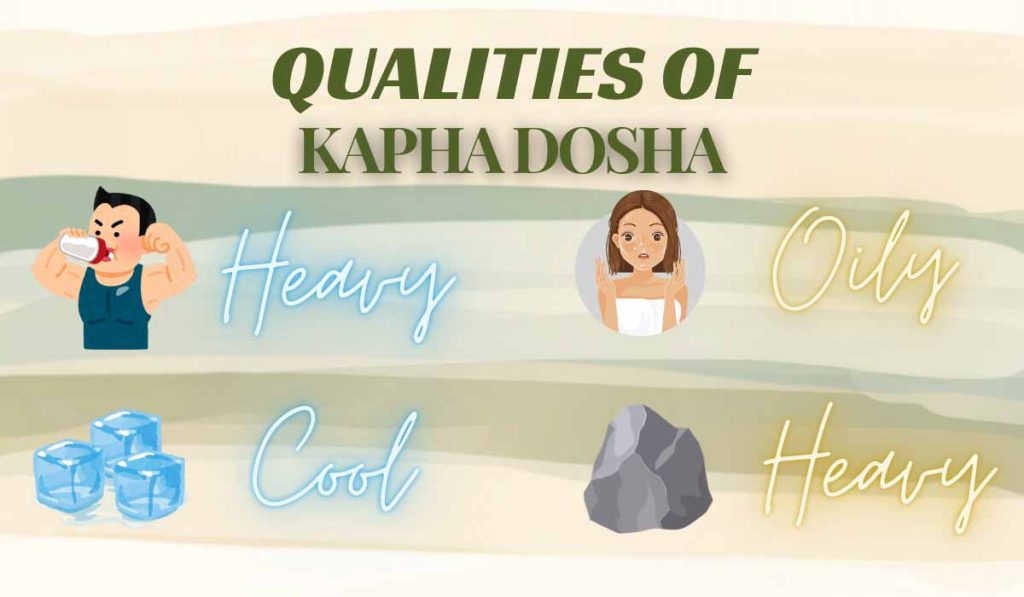Introduction to Kapha Dosha
Kapha is synonymous with ‘Shleshma,’ which means to embrace, unite, or keep together.
Kapha is derived from a combination of Jala (water) and Prithvi (earth) elements, with water being the dominant force.
Pure water or earth is found outside the living systems, not inside. Stones, for example, are earthy and abundant outside. But if a stone were detected inside the human body, it would represent an anomaly or a disease worthy of being dissolved inside or thrown out of the body.
The same is true for edema or swelling anywhere in the body. It represents pure water and must be dried up.
When water and earth live in peace, Kapha is born, and there is health.
Gunas (qualities) of Kapha
As Kapha is dominated by water, it is :
• Snigdha(moist/oily)- all the oils and fats will increase Kapha in the system
• Sheeta (cool)- as Kapha has enough mass, the cooling quality is not as strong as Vata. A Kapha body type being bestowed with enough mass and structure will not be as cold as a Vata body type
• Shukla (whitish or light colored)- it reflects most of the wavelengths of light
• Guru (heavy)- water and earth elements render it heavy
• Sthira ( stable)-
• Shalakshana (smooth)
Seats of Kapha
Kapha dosha pervades the whole body, but it has a particular affinity for certain parts.
Parts that are dominated by Sneha or fats are special seats of Kapha.
The brain is rich in fats and is a special seat of Kapha. My teacher used to say that if we took out the brain, put it in a vessel, and kept ghee in another vessel, it would look the same. The brain has continuous Vata (nervous) stimulus, so nature provides many Kapha (fats) to protect it.
Due to movements, joints receive a lot of energy from Vata. Kapha sits in the joints as synovial fluid and protects them. As this Kapha dries up over time, a cracking sound of Vata starts to appear.
Tongue is another important seat of Kapha. It secretes about two ltrs. Of saliva in a day. This
Functions of Kapha
Normal Kapha dosha performs the following functions, which are nothing but manifestations of its qualities:
• Strength- it bestows strength to the body
• Strength and lubrication of joints
• Increase in bulkiness/ mass
• Vigour
• Potency and fertility
• Forgiveness
• Satisfaction
The dual role of Kapha
According to Charaka, Kapha is bala or strength in its normal state. When it becomes imbalanced, it is transformed into mala or ama, which sticks around as a toxin.
प्राकृतस्तु बलं श्लेष्मा विकृतो मल उच्यते।
Charaka 17th chapter
Ayurveda discusses many Vata diseases and a lesser number of Kapha diseases. In the past, people were very active and had to work hard to achieve good nutrition. In the modern scenario, however, with readily available nutrition and less activity, society has more Kapha diseases. These are diabetes, obesity, high cholesterol, hypothyroidism, PCOD, etc.
All the diseases where hormones cannot produce their effects as a result of hormonal receptor blockage are Kapha diseases. The receptors are blocked by bad fat (imbalanced Kapha)
How to balance Kapha
Kapha is predominantly the force of water. It needs to be dried up to remove excess water from the system. This can be achieved by:
Exercise should induce sweating. According to Ayurveda, sweat is the metabolic waste of fats. When fats are burned, sweat is produced.
Fasting: During fasting, the body eats the bad fats, creating space for the wind to move around. The wind induces a feeling of lightness and freshness.
Bitter—astringent foods—These are foods with less Kapha content. They are green leafy vegetables, lentils, etc.
Pungent foods include spices like ginger, garlic, peppers, etc. The heat of these spices dries up extra Kapha in the system.
Challenging oneself: Comforts increase Kapha. Kapha will be reduced by:
• taking up new challenges
• being out of the comfort zone
• facing ups and downs



